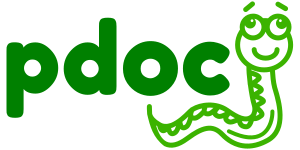 | |
| Original author(s) | Andrew Gallant |
|---|---|
| Developer(s) | Mitmproxy Project |
| Initial release | August 9, 2013 |
| Stable release | |
| Repository | github |
| Written in | Python |
| Operating system | Cross-platform |
| Type | Documentation generator |
| License | Public Domain (UNLICENSE) |
| Website | pdoc |
Pdoc is a software package for generating API documentation for Python programming language. Built as a successor to Epydoc, [2] Pdoc uses introspection to extract documentation from source code docstrings and allows programmers to generate HTML documentation for chosen Python modules. It is thus functionally similar to Pydoc, Perldoc and Javadoc. It supports identifier cross-linking and Markdown for its doc string format. [3]